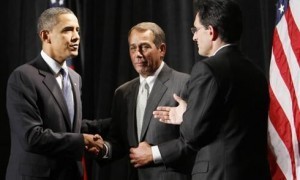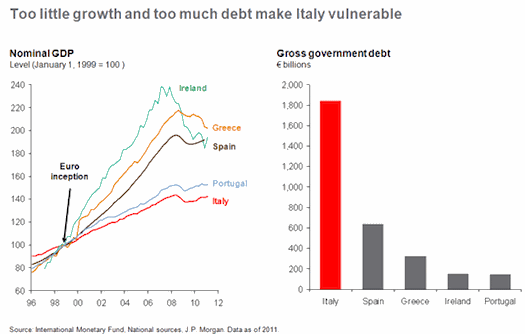Matthew Yglesias's Blog, page 2233
July 22, 2011
Tackling Too-Big-To Fail

I've come around to the view that the Dodd-Frank financial regulation bill was pretty underrated at the time it passed. In particular, the more I read about the events leading up to TARP, the more it becomes clear to me that the dreaded "bailouts" occurred in large part because of a total lack of logistically feasible alternatives. The knowledge wasn't there to even know how many banks were insolvent or to resolve various claims that people had on them. And as the mystery lawyer behind Economics of Contempt explains in a very informative interview with Mike Konczal a lot of progress has been made on this front in one year of implementation:
EoC: I think this is going well. We basically knew what the rules for the resolution authority were going to look like already — they were going to be very similar to the rules governing FDIC resolutions of commercial banks. The real movement in this space has been in the so-called "resolution plans" that the major banks have to submit (and regularly update). The proposed rule on resolution plans was very strong — it ensures that the FDIC will have all the information it needs when it comes time to actually resolve a major bank. That's crucial, because a successful resolution of a major bank will have to be planned out in advance and be reasonably comprehensive. The proposed resolution plan rule also allows the FDIC and the Fed to identify any legal or funding structures that would cause problems in a future resolution, and gives the FDIC the authority to force the banks to restructure in a way that would make a future resolution easier.
The FDIC and the Fed were supposed to vote on the final rule for resolution plans earlier this month but ended up pushing the vote to next month. (I think the final rule just wasn't finished in time, which is understandable.)
I'm not sure I agree that moral hazard around "too big to fail" really was all that causally important to the banking crisis. But it clearly doesn't help. And whether or not it was the cause of economic problems, it was certainly a moral scandal and introduced an element of political toxicity into all further debates about recovery measures. It also appears to be one on which major unheralded progress is being made. Meanwhile, the right continues to promise to undue it all while simultaneously complaining about bailouts.


'Alexander Hamilton'

I've been listening to Ron Chernow's giant 2004 biography Alexander Hamilton for a while now, but it's finally finished. This is a kind of exhausting book, but I liked it much better than his Washington biography. Insofar as Founding Father bios seem destined to be hagiographies, Hamilton is a great subject because his flaws are really undeniable. Chernow can't defend the guy's wilder excesses. Not the plan to make the presidency a lifelong post, not the madcap scheme to conquer South America, not the Alien and Sedition Acts, not the weird effort to undermine Adams in the 1796 election, and certainly not the bizarre effort to undermine Adams in the 1800 election. But what you get instead is a sincere effort to explain how it is a person Chernow clearly admires could have reached these weird conclusions.
Meanwhile, Chernow really has the chops to explain how and why it is that Hamilton was right about the big questions he was in fact right about — federal debt assumption, the creation of a banking system, the tariff and customs service, and the idea that a strong and effective federal government wasn't a slide into tyranny. Chernow also rightly highlights the existence of meaningful slavery debates even in the 18th century and the fact that some people, Hamilton among them, were on the right side and the Jeffersons and Madisons of the world weren't just "men of their time" but legitimate bad guys in a live political controversy. Personally, I think it's a bit odd that Chernow is able to get himself so emotionally invested in the partisan politics of the 1790s but the zeal makes for a good book.
For my part, as a non-hagiographer I will say that something I find impressive about Hamilton is his ability to be an extremist. He was an extremely clear thinker, who saw problems and didn't shy away from proposing what he saw as the correct solution. Especially as we better understand the depth of the economic slump into which the country slid in the 1770s and 1780s the clear-sighted guidance of U.S. economic policy in the early days is really impressive. Doing the minimum necessary to stave off catastrophe seems like a perennially tempting option. Making the bold moves to in succession of initiatives restore the credit and trade of the country is pretty amazing.


The Politics Of Grand Bargaineering

Paul Krugman slams President Obama's continued pursuit of a "grand bargain" with the GOP, and Jon Chait points out that there's an obvious alternative negotiating strategy that will result in higher revenues. But David Brooks hails the grand bargain.
I don't think it's that hard to see what's going on here. Obviously neither Chait nor Krugman is going to vote for Mitt Romney no matter what Obama does or how bad the economy is. And while Brooks will almost certainly vote for Romney over Obama, I think it's easy to imagine him voting for Obama over Michele Bachmann. To my mind, producing a robust economic recovery would be a much sounder re-election strategy than seeking the approval of center-right opinion leaders. But insofar as the president has embraced economic fatalism, this doesn't look like an option. Desire to court center-right opinion elites has been a part of Obama's approach since his arrival in the US Senate. At times, though, he's put a higher priority on things like enacting a stimulus bill or getting congress to pass a universal health care law. This summer, the train's headed in the other direction. I think this is, in fact, "11-Dimensional Chess." It's just that it's 11-Dimensional Chess whose purpose is to achieve a legislatively viable grand bargain rather than to achieve the most left-wing possible policy outcome.


It's Very Hard To Take Money Out Of Politics

It's certainly true as Kevin Drum says that one thing that happens when politicians don't have the money to buy tons of television ads is that the guys who own newspapers get a lot of power. But I think it's worth pointing out that this is just one of the many ways that money is bound to talk in the political system no matter what you do with campaign finance. Politicians are very dependent on lobbyists and trade associations not just for money, but for knowledge, expertise, and analytical capacity. But of course lobbyists and trade associations have those things in part because they cost money.
This is, I think, a pretty huge problem. But it's not really one that can be solved by reducing people's ability to give money to politicians. What's needed are institutional reforms that give politicians more capacity to do analysis, and that put more political authority in the hands of politicians who have analytic capacity at their disposal. Whenever a decision is made "by the states" that means, in many places, that the decision is being made by term-limited part-time state legislators who have no practical alternative but to rely on lobbyists for guidance and information.


A Goodbye To Borders

When I was growing up, the kind of people who today are lamenting the decline of physical books in the face of e-reading were busy bemoaning the decline of independent bookstores in the face of ruthless national chains. As it happens, where I grew up our local independent bookstore was a little place called Barnes & Noble that, obviously, grew and became one of the major national chains. So I never was quite on the chain-bashing kick. Then when I moved to DC, I was actually more in proximity to some Borders outlets, which were also cool. Consequently, it wound up touching me in a surprise way to wake up this morning to a Borders email saying "goodbye" to everyone who'd been on their spam list all those years. Like Dave Weigel, I credit browsing the magazine racks at the bookstores ("Already, I was into politics, but didn't know much about the world outside Time and Newsweek. Here was a store with six magazine racks and unfamiliar offerings like The Nation and National Review and In These Times and Reason") of yore for teaching me about the world. Here I perused issues of Foreign Affairs and Mother Jones and who knows whatever else. The world seems small when you're young.
But even later when my magazine reading went on line, for years in DC my go-to time-killer was to spend some time in a Borders flipping through graphic novels or books. And I would feel sentimental about abusing the place, and usually make sure to buy things there. I love shopping online, but I was actually quite resistant to the original Amazon business of buying books online because I wanted to support the idea of a bookstore. And to me a bookstore meant not a quaint little dusty shop somewhere, but precisely a Borders or a Barnes & Noble. A bright, large, well-kept shiny temple to media! Magazines! DVDs! Twenty percent off on new hardcovers! Coffee! Bathrooms! Comic books! A perfect self-contained ecosystem. A place to be alone, and yet a place to see and be seen. If you'd told me in 1999 that this social institution would be outlived by (of all things) the public library, I would have been blown away.
And yet there you have it. Borders Books and Music is no more, joining HMV and Tower Records on the dustbin of media sales. Apple's taking retail boxed software off their shelves. Long live digital downloading and long live the library. People still need places to go to get away from parents, roommates, and the rest of it all, right?


Blast In Oslo Hits Government Office Buildings
Reuters reports that an explosion in Oslo today has blown out most of the windows of the government building housing the Norwegian prime minister's office. A Norwegian news site has photos of the aftermath:
Update
Reuters says that Prime Minister Jens Stoltenberg is safe. Also, its correspondent reports at least 8 people are injured and that, though the cause of the blast is as yet unknown, "the tangled wreckage of a car was outside one building."
Update
According to a Google translation of another Norwegian news site, "several car bombs" went off near government buildings in Oslo. France 24 reports that there has been at least one fatality.
Update
See amateur video of the aftermath here and here. Watch the BBC's live coverage here. Norwegian news site NRK has live updates and video.
Update
The BBC reports that "Norwegian police confirm that a bomb caused the explosion outside the prime minister's office – and there are deaths and injuries."


Are Eurobonds In Fact Unthinkable?

Peter Bofinger, not history's greatest monster.
The conventional wisdom in the United States is that fiscal integration of the Eurozone via the introduction of Eurobonds is politically unthinkable, especially in Germany. So I was somewhat surprised to see that the Social Democratic Party's coverage of the deal is a news analysis from economist Peter Bofinger, which is teased with "Er plädiert noch mal für Eurobonds und eine integrierte Bankenaufsicht." My understanding is that means "he pleaded against for Eurobonds and integrated bank supervision." Here's Google Translate trying to explain his ideas:
I plead for my model "Euro 20″: A financing would generally made on a common treasury, over Eurobonds. Countries with high debt, since I would be 60 percent debt and would have more to say, the budget in advance by the European Parliament can approve. It would have an integrated banking supervision instead of this totally ineffective European Council give for systemic risk. Three-quarters of the problems have arisen due to poor banking supervision and not due to insufficient fiscal discipline! For me, this would include that one – if one has such a system – the possibility of getting "out enforce the" one country, if it is fundamentally in fiscal policy fails to comply with the requirements.
And, indeed, here speaking to Bloomberg he accentuates the point:
Merkel, who calls the single currency a "work of peace" and part of Europe's "uniting idea," is the key holdout on so- called euro bonds. With leaders meeting in Brussels today, her stance may eventually weaken amid signs the heart of Europe is becoming infected by the 21-month debt crisis as yields on Spanish and Italian 10-year bonds reach euro-era records.
"Once they look into the abyss of a major speculative attack on Italy," Merkel will have to embrace euro bonds, Peter Bofinger, a member of the chancellor's Council of Economic Advisers, said in a telephone interview. "That would be the turning point. There needs to be a joint guarantee for all outstanding debt."
Only Bofinger, as I understand it, isn't actually a Merkel advisor. What's happening is that Germany has a five-member non-partisan council of economic experts and Bofinger is the most left-wing of the group. But his views are the views that the leading opposition party is choosing to highlight at a moment when it seems like a red-green coalition could easily beat Merkel if the election were held today. The Green Party, for the record, also supports Eurobonds. So it at least seems to me that the problem with Eurozone fiscal integration isn't exactly that "Germans" don't want it as much as it is that the current incumbent governing coalition in Germany doesn't it want it. Now whether a hypothetical Red-Green government would actually go through with this idea is another question, but it's at least what they (correctly) say ought to be done.


Breakfast Links: July 22, 2011
— Proposed law would jail critics of Saudi King.
— CIA undermining fight against polio.
— If Obama gives the store away to John Boehner will Democrats balk?
— Default could kill the housing market.
— Eurozone deal's benefits for Ireland.
— MTA chief heading for a private transit company in Hong Kong.
— In defense of lamb, at least relative to beef.
— Platinum!
— How Amazon ruins everything.


July 21, 2011
Remember Tim Pawlenty?
Greek Bailout Leaves Larger Issues Unresolved
I'm still trying to fully understand what's happening in the latest European debt plan, but at first glance it seems to be almost entirely besides the point—a plan to address insolvency in Greece at a time when as Megan McArdle says "[t]he spreads on Spanish, Italian, Irish, and Portuguese bonds are not widening because investors think that Greece needs a debt swap, or because the solons of Brussels haven't made enough announcements about the virtues of budget-cutting." Right, the spreads on PII[G]S' bonds are going up because of concerns about those specific countries. An uncontrolled Greek default would make the situation worse, but merely avoiding such a scenario doesn't address the issues there.
I think it's worth just plowing straight forward and looking at Italy, the largest and allegedly least-troubled of the PIIGS. This from JP Morgan is very instructive:

To review, Italy has a lot of debt. That means that Italy pays a lot of money in interest on its debt. But Italy also has what's called a "primary budget surplus." That means tax revenues exceed non-interest spending. Normally for a country that borrows in its own currency that's all the austerity you need. Since your debt is denominated in nominal terms in your own currency, all you need is for your nominal GDP to grow fast enough to ensure that your debt:GDP ratio shrinks. And since shrinking debt:GDP ratio reduces the interest burden on your budget, if you can hold that primary surplus flat soon enough you'll be making enormous progress. Alternatively, your central bank might be so stingy as to insist on NGDP growing so slowly that your debt:GDP ratio rises despite the primary surplus. That means your interest burden rises and your situation spirals into disaster. Except no country's central bank would be that insane. If fiscal policymakers deliver the primary surplus, the central bankers can take care of the rest. But Italy's central bank is located in Frankfurt and doesn't appear to actually care about Italian conditions. Instead, responding to conditions in Germany, the European Central Bank is setting monetary policy that ensures a rising debt burden for Italy.
That's a problem for Italy. Indeed, it makes me wonder how Italy can avoid default. And wondering about that is making investors charge a high interest rate for Italy to roll its debts over. Which is making Italy's debt:GDP ratio even worse. And as best I can tell, today's announcement doesn't even gesture at trying to address this, much less the even more acute problems facing Spain, Portugal, and Ireland. It seems to promise that austerity will take care of this. But in the case of Italy, austerity will only slow NGDP growth further. There has to be a commitment that countries engaged in reasonable budgetary practices will enjoy sufficiently rapid growth to manage existing debts.


Matthew Yglesias's Blog
- Matthew Yglesias's profile
- 72 followers





